
Ann Druyan is an American documentary producer and director specializing in the communication of science. She co-wrote the 1980 PBS documentary series Cosmos, hosted by Carl Sagan, whom she married in 1981. She is the creator, producer, and writer of the 2014 sequel, Cosmos: A Spacetime Odyssey and its sequel series, Cosmos: Possible Worlds, as well as the book of the same name. She directed episodes of both series.
Nova is an American popular science television program produced by WGBH in Boston, Massachusetts, since 1974. It is broadcast on PBS in the United States, and in more than 100 other countries. The program has won many major television awards.

Brian Denis Cox is a Scottish actor. A classically trained Shakespearean actor, he is known for leading performances on stage and television, as well as supporting roles in film. His numerous accolades include two Laurence Olivier Awards, a Primetime Emmy Award, and a Golden Globe Award as well as a nomination for a British Academy Television Award. In 2003, he was appointed to the Order of the British Empire at the rank of Commander. Empire magazine awarded him the Empire Icon Award in 2006, and the UK Film Council named him one of the top 10 powerful British film stars in Hollywood in 2007.
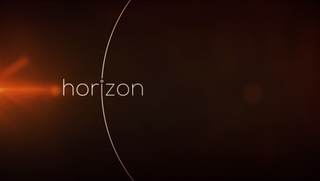
Horizon is an ongoing and long-running British documentary television series on BBC Two that covers science and philosophy.

"Mission to the Unknown" is the second serial of the third season of the British science fiction television series Doctor Who. Written by Terry Nation and directed by Derek Martinus, the single episode was broadcast on BBC1 on 9 October 1965. The only standalone regular episode of the show's original run, it serves as an introduction to the 12-part story The Daleks' Master Plan. It is notable for the complete absence of the regular cast and the TARDIS; it is the only serial in the show's history not to feature the Doctor at all. The story focuses on Space Security Agent Marc Cory and his attempts to warn Earth of the Daleks' plan to take over the Solar System.

Zachary John Quinto is an American actor and film producer. He is known for his roles as Sylar, the primary antagonist from the science fiction drama series Heroes (2006–2010); Spock in the film Star Trek (2009) and its sequels Star Trek Into Darkness (2013) and Star Trek Beyond (2016); Charlie Manx in the AMC series NOS4A2, and Dr. Oliver Thredson in American Horror Story: Asylum, for which he received a nomination for an Emmy award. His other starring film roles include Margin Call (2011), Hitman: Agent 47 (2015), Snowden (2016), and Hotel Artemis (2018). He also appeared in smaller roles on television series, such as So Notorious, The Slap, and 24, and on stage in Angels in America, The Glass Menagerie, and Smokefall.

Brian Edward Cox is an English physicist and musician who is a professor of particle physics in the School of Physics and Astronomy at the University of Manchester and The Royal Society Professor for Public Engagement in Science. He is best known to the public as the presenter of science programmes, especially BBC Radio 4’s The Infinite Monkey Cage and the Wonders of... series and for popular science books, such as Why Does E=mc2? and The Quantum Universe.
Christopher Riley is a British writer, broadcaster and film maker specialising in the history of science. He has a PhD from Imperial College, University of London where he pioneered the use of digital elevation models in the study of mountain range geomorphology and evolution. He makes frequent appearances on British television and radio, broadcasting mainly on space flight, astronomy and planetary science and was visiting professor of science and media at the University of Lincoln between 2011 and 2021.

Frozen Planet is a 2011 British nature documentary series, co-produced by the BBC ZDF and The Open University. It was filmed by the BBC Natural History Unit. The production team, which includes executive producer Alastair Fothergill and series producer Vanessa Berlowitz, were previously responsible for the award-winning series The Blue Planet (2001) and Planet Earth (2006), and Frozen Planet is billed as a sequel of sorts. David Attenborough returns as narrator. It is distributed under licence by the BBC in other countries, Discovery Channel for North America, ZDF for Germany, Antena 3 for Spain and Skai TV for Greece.
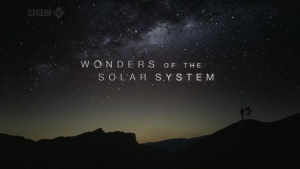
Wonders of the Solar System is a 2010 television series co-produced by the BBC and Science Channel, and hosted by physicist Brian Cox. Wonders of the Solar System was first broadcast in the United Kingdom on BBC Two on 7 March 2010. The series comprises five episodes, each of which focuses on an aspect of the Solar System and features a 'wonder' relevant to the theme. The series was described as one of the most successful to appear on BBC Two in recent years. An accompanying book with the same name was also published.

Planet Earth is a seven-episode 1986 PBS television documentary series focusing on the Earth, narrated by Richard Kiley.
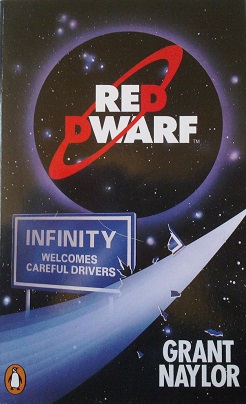
Red Dwarf: Infinity Welcomes Careful Drivers is a best-selling science fiction comedy novel by Grant Naylor, the collective name for Rob Grant and Doug Naylor, co-creators and writers of the Red Dwarf television series, on which the novel is based. First published in 1989, the novel presents the plotline of the TV series as a cohesive linear narrative, providing expanded backstory of the Red Dwarf world and more fully developing each of the characters, particularly Dave Lister and Arnold Rimmer. The book incorporates elements and scenes from the first and second-season episodes The End, Future Echoes, Kryten, Me² and Better Than Life. In 1990, the book was followed by a sequel, Better Than Life.

Wonders of the Universe is a 2011 television series produced by the BBC, Discovery Channel, and Science Channel, hosted by physicist Professor Brian Cox. Wonders of the Universe was first broadcast in the United Kingdom on BBC Two from 6 March 2011. The series comprises four episodes, each of which focuses on an aspect of the universe and features a 'wonder' relevant to the theme. It follows on from Cox's 2010 series for the BBC, Wonders of the Solar System. An accompanying book with the same title was also published.
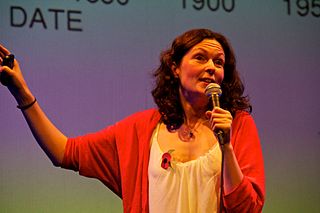
Lucinda "Lucie" May Green is a British science communicator and solar physicist.

The Infinite Monkey Cage is a BBC Radio 4 comedy and popular science series. Hosted by physicist Brian Cox and comedian Robin Ince, The Independent described it as a "witty and irreverent look at the world according to science". Since 2013 the show has been accompanied by a podcast, published immediately after the initial radio broadcast, which features extended versions of most episodes. The programme won a Gold Award in the Best Speech Programme category at the 2011 Sony Radio Awards, and it won the best Radio Talk Show at the 2015 Rose d'Or awards. The name is a reference to the infinite monkey theorem.
Stargazing Live is a British live television programme on astronomy that was broadcast yearly on BBC Two over three nights every winter from 2011 to 2017. The series was primarily presented by scientist Brian Cox and comedian and amateur astronomer Dara Ó Briain with support from TV presenter and biochemist Liz Bonnin and astronomer Mark Thompson. For the first six series, the show was broadcast from Jodrell Bank Observatory in Cheshire, and featured live links from scientific facilities in locations such as Hawaii, South Africa, and Norway. The seventh series in 2017 was broadcast from Siding Spring Observatory in Australia, and a special episode filmed at Kennedy Space Center was broadcast in July 2019 to celebrate the 50th anniversary of the Apollo 11 mission.

Human Universe is a British television series broadcast on BBC Two, presented by Professor Brian Cox. An accompanying book was also published.
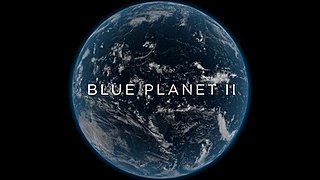
Blue Planet II is a 2017 British nature documentary series on marine life produced by the BBC Natural History Unit. Like its predecessor, The Blue Planet (2001), it is narrated and presented by the naturalist Sir David Attenborough.

The Science Programme of the European Space Agency is a long-term programme of space science and space exploration missions. Managed by the agency's Directorate of Science, The programme funds the development, launch, and operation of missions led by European space agencies and institutions through generational campaigns. Horizon 2000, the programme's first campaign, facilitated the development of eight missions between 1985 and 1995 including four "cornerstone missions" – SOHO and Cluster II, XMM-Newton, Rosetta, and Herschel. Horizon 2000 Plus, the programme's second campaign, facilitated the development of Gaia, LISA Pathfinder, and BepiColombo between 1995 and 2005. The programme's current campaign since 2005, Cosmic Vision, has so far funded the development of ten missions including three flagship missions, JUICE, Athena, and LISA. The programme's upcoming fourth campaign, Voyage 2050, is currently being drafted. Collaboration with agencies and institutions outside of Europe occasionally occur in the Science Programme, including a collaboration with NASA on Cassini–Huygens and the CNSA on SMILE.
















